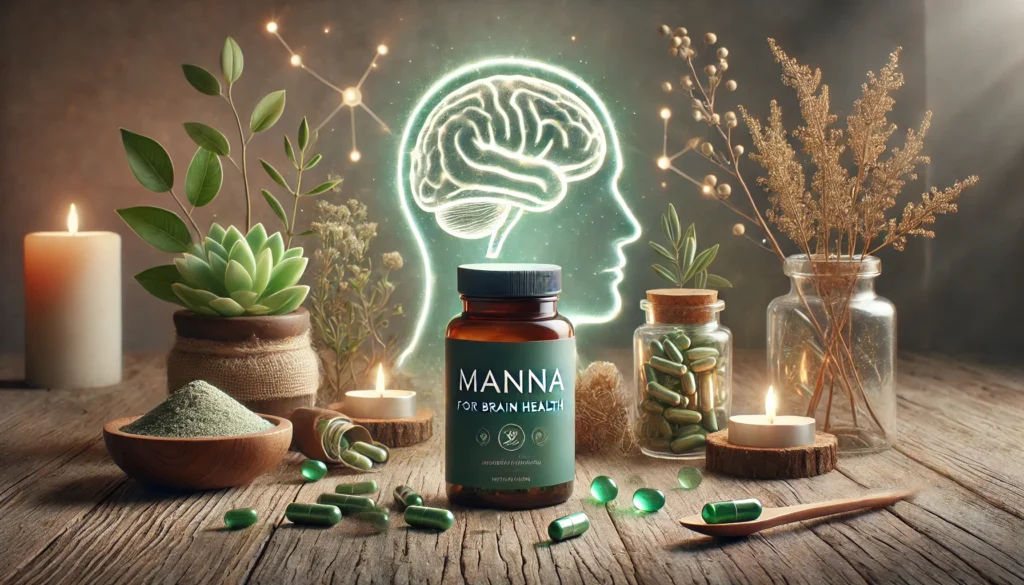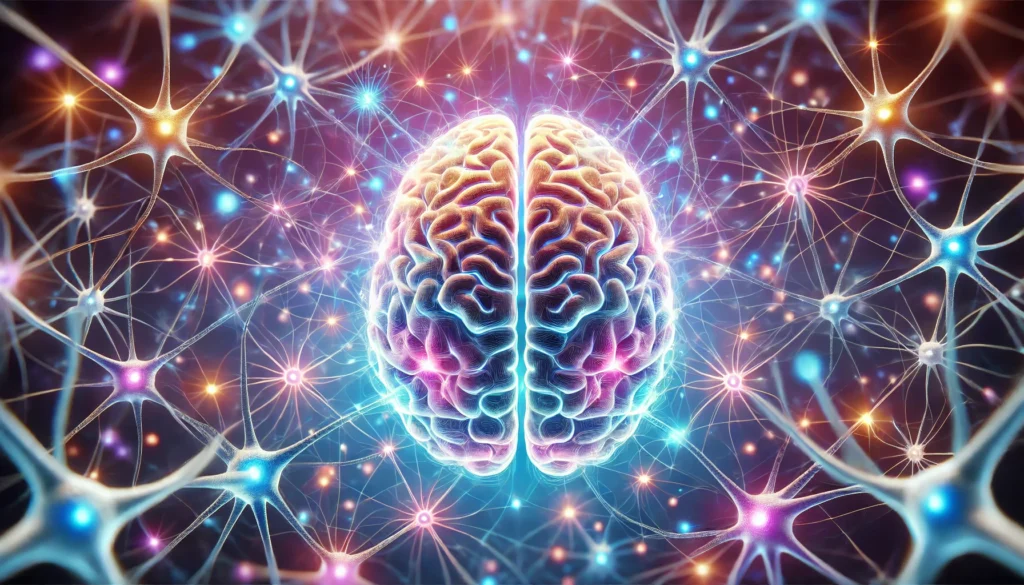Manna, a term steeped in history and myth, has reemerged in modern health discussions as a potential nootropic supplement. Traditionally referred to as a divine provision in ancient texts, contemporary manna products often derive from plant exudates or natural saccharide-rich substances that may support cognitive health and overall wellness. Although research on manna’s nootropic properties is in its early stages, its bioactive components suggest it has a role in enhancing mental clarity, supporting brain metabolism, and promoting neuroprotection.
This article provides a comprehensive analysis of manna as a nootropic, delving into its origins, chemical composition, physiological mechanisms, potential cognitive benefits, proper dosing, safety considerations, and interactions with other supplements and medications.
You May Also Like:
Manna: Potential Nootropic Benefits, Dosage, Side Effects, Interactions, and Other Important Information About This Supplement is an original (NootropicsPlanet) article.
Sources of Manna
Manna supplements typically originate from various natural sources. These include:
1. Tamarisk Trees (Tamarix spp.)
Historically, manna from tamarisk trees was collected as a sugary exudate in arid regions. This type of manna is rich in saccharides such as glucose, fructose, and sucrose, along with trace minerals that contribute to its potential health benefits.
2. Ash Trees (Fraxinus spp.)
The “manna ash,” a product of the Fraxinus species, contains significant amounts of mannitol, a sugar alcohol with osmotic and detoxifying properties. This type of manna has been traditionally used for its mild laxative effects but is now being explored for its potential brain-supportive qualities.
3. Fungi and Lichens
Some manna-like substances are derived from fungi or lichens, which are known for their adaptogenic and prebiotic properties. These sources may contain bioactive compounds like polysaccharides, beta-glucans, and phenolic antioxidants that benefit brain health indirectly through their effects on the immune system and gut microbiome.
4. Modern Formulations
Commercial manna supplements often combine these natural sources or isolate specific components like mannitol and polysaccharides to create targeted products aimed at supporting cognition, gut health, or metabolic balance.

Chemistry of Manna
The chemical composition of manna varies depending on its source. However, some common active components include:
1. Mannitol
Mannitol, a naturally occurring sugar alcohol, is the primary constituent in many manna supplements. Its unique osmotic properties make it effective in regulating cellular hydration, detoxifying neural tissues, and potentially improving cognitive clarity. Mannitol also has antioxidant effects, further supporting neuroprotection.
2. Polysaccharides
Polysaccharides like beta-glucans and fructooligosaccharides (FOS) are prominent in manna derived from plants and fungi. These compounds serve as prebiotics, feeding beneficial gut bacteria and promoting a healthy gut-brain axis, which is increasingly recognized as critical to cognitive health.
3. Phenolic Compounds
Manna sourced from plants often contains phenolic antioxidants that neutralize reactive oxygen species (ROS), reduce inflammation, and protect neurons from oxidative stress. These properties are vital for maintaining cognitive function, especially in aging populations.
4. Trace Minerals
Minerals such as magnesium, zinc, and selenium are often present in manna. These elements play critical roles in neural signaling, neurotransmitter synthesis, and enzymatic antioxidant systems like glutathione peroxidase, which safeguard brain cells from damage.
Physiological Mechanisms of Manna in the Body and Brain
The bioactive components of manna influence several physiological pathways, making it a potential nootropic supplement. Here are the primary mechanisms through which manna acts:
1. Energy Metabolism in the Brain
Manna’s saccharides, including mannitol and glucose, serve as energy substrates, fueling neurons’ high metabolic demands. By ensuring an adequate energy supply, manna supports cognitive functions such as focus, memory, and learning.
2. Neuroprotection Through Antioxidants
Phenolic compounds and trace minerals in manna contribute to its antioxidant properties. These compounds neutralize ROS, preventing oxidative damage to neurons. This function is particularly critical in the brain, where oxidative stress is a major contributor to cognitive decline and neurodegenerative diseases like Alzheimer’s and Parkinson’s disease.
3. The Gut-Brain Axis
Polysaccharides in manna act as prebiotics, feeding beneficial gut bacteria. The gut microbiome produces metabolites like short-chain fatty acids (SCFAs), which influence brain health by regulating neurotransmitter levels, reducing systemic inflammation, and supporting the integrity of the blood-brain barrier.
4. Osmotic Regulation and Detoxification
Mannitol’s ability to attract water molecules helps in the detoxification of neural tissues, reducing cerebral edema (swelling) and promoting optimal cellular hydration. This mechanism may alleviate symptoms such as brain fog and improve mental clarity.
Unlock Brain Health and Mental Resilience with Advanced Bacopa Monnieri—Shop Now on Amazon!

Nootropic Benefits of Manna
The potential cognitive benefits of manna stem from its chemical properties and physiological actions. While rigorous clinical research is limited, several key benefits have been hypothesized:
1. Enhanced Cognitive Clarity and Focus
By supporting energy metabolism and reducing oxidative stress, manna may improve cognitive clarity and focus. Mannitol’s detoxifying effects can further alleviate brain fog caused by inflammation or metabolic inefficiencies.
2. Neuroprotection Against Aging
The antioxidant properties of manna’s phenolic compounds may protect neurons from damage caused by aging and environmental stressors. Regular supplementation could help mitigate age-related cognitive decline and reduce the risk of neurodegenerative conditions.
3. Mood Regulation and Stress Resilience
Trace minerals like magnesium and zinc found in manna are essential for neurotransmitter synthesis and stress hormone regulation. This suggests that manna could have a stabilizing effect on mood and enhance resilience to psychological stress.
4. Support for Gut-Brain Health
By promoting a diverse and healthy gut microbiome, manna’s prebiotic polysaccharides may indirectly enhance cognitive function. Improved gut health has been linked to better memory, mood, and overall mental performance.

Dosage and Supplementation Guidelines
The optimal dosage of manna depends on its form, concentration, and intended use. General guidelines are provided below:
1. General Cognitive Support
For daily cognitive enhancement, 1-2 grams of manna powder or its equivalent is often sufficient. This dose is low enough to avoid side effects while providing potential nootropic benefits.
2. Neuroprotective or Therapeutic Use
Higher doses, ranging from 2-5 grams per day, may be beneficial for neuroprotection or as part of a regimen for addressing age-related cognitive decline. These doses should be taken under medical supervision to monitor tolerance and safety.
3. Forms of Manna Supplements
- Powders: Easy to mix with water, smoothies, or other beverages.
- Capsules: Provide precise dosing and convenience for daily use.
- Liquid Extracts: Concentrated forms often combined with other nootropics for enhanced effects.
It is advisable to start with a lower dose and gradually increase it based on individual tolerance and desired outcomes.
Side Effects and Safety
Manna is generally well-tolerated, but like any supplement, it may cause side effects in some individuals, especially at higher doses or with prolonged use.
Common Side Effects
- Digestive Discomfort: Mannitol and polysaccharides can cause bloating, gas, or diarrhea in individuals with sensitive digestive systems.
- Electrolyte Imbalance: Excessive mannitol intake may disrupt electrolyte balance, particularly in individuals with kidney dysfunction.
- Allergic Reactions: Rare cases of skin rashes, itching, or swelling have been reported, likely due to sensitivities to plant-derived components.
Precautions
Pregnant or breastfeeding women and individuals with pre-existing health conditions should consult a healthcare provider before using manna supplements.

Interactions with Other Supplements and Medications
Manna supplements may interact with various medications and supplements, necessitating caution in certain cases.
1. Medications
- Diuretics: Mannitol’s osmotic effects may amplify the action of diuretics, increasing the risk of dehydration or electrolyte imbalances.
- Antidiabetic Drugs: The sugars in manna may influence blood glucose levels, requiring close monitoring for individuals on insulin or other hypoglycemic medications.
2. Supplements
- Minerals: Manna’s trace minerals like magnesium and zinc may interact with other mineral supplements, potentially leading to excess intake if not properly balanced.
- Adaptogens: Combining manna with adaptogens such as ashwagandha or Rhodiola rosea may enhance its nootropic effects but could also increase the risk of overstimulation.
3. Stimulants
- Manna’s energy-enhancing properties may amplify the effects of stimulants like caffeine, which could lead to jitteriness or insomnia if not taken in moderation.
Risks for Individuals with Certain Health Conditions
While manna is generally safe for healthy individuals, certain populations should use it cautiously:
1. Kidney Disease
Mannitol is excreted via the kidneys, and excessive doses could strain renal function. Individuals with chronic kidney disease or reduced clearance should avoid high-dose manna supplements.
2. Diabetes
Due to the natural sugars present in some manna products, individuals with diabetes should select sugar-free formulations or closely monitor their blood glucose levels.
3. Gastrointestinal Disorders
Those with irritable bowel syndrome (IBS) or other digestive conditions may experience discomfort from the osmotic effects of mannitol or the prebiotic activity of polysaccharides.
Conclusion: Is Manna a Safe and Effective Nootropic?
Manna holds promise as a natural supplement for cognitive enhancement and overall well-being. Its rich composition of mannitol, polysaccharides, phenolic compounds, and trace minerals provides a multifaceted approach to supporting brain health. Potential benefits include improved focus, enhanced mental clarity, neuroprotection, and mood regulation, along with indirect effects on cognition through gut health.
However, as research on manna’s nootropic effects is still evolving, individuals should approach supplementation with care. Consulting a healthcare professional is recommended, particularly for those with pre-existing medical conditions, those on medications, or those planning to use manna as part of a broader nootropic stack.
In summary, manna combines ancient tradition with modern health science, offering a unique and intriguing option for those exploring natural ways to support cognitive function. By adhering to recommended dosages and monitoring individual responses, manna can be a safe and effective addition to a holistic wellness regimen.

References:
- Manna – Uses, Side Effects, and More. Retrieved from: https://www.webmd.com/vitamins/ai/ingredientmono-110/manna
- Neuroprotective Effects of Phytochemicals in Brain Ageing. Retrieved from:https://link.springer.com/book/10.1007/978-981-99-7269-2
Important Note: The information contained in this article is for general informational purposes only, and should not be construed as health or medical advice, nor is it intended to diagnose, prevent, treat, or cure any disease or health condition. Before embarking on any diet, fitness regimen, or program of nutritional supplementation, it is advisable to consult your healthcare professional in order to determine its safety and probable efficacy in terms of your individual state of health.
Regarding Nutritional Supplements Or Other Non-Prescription Health Products: If any nutritional supplements or other non-prescription health products are mentioned in the foregoing article, any claims or statements made about them have not been evaluated by the U.S. Food and Drug Administration, and such nutritional supplements or other health products are not intended to diagnose, treat, cure, or prevent any disease.


